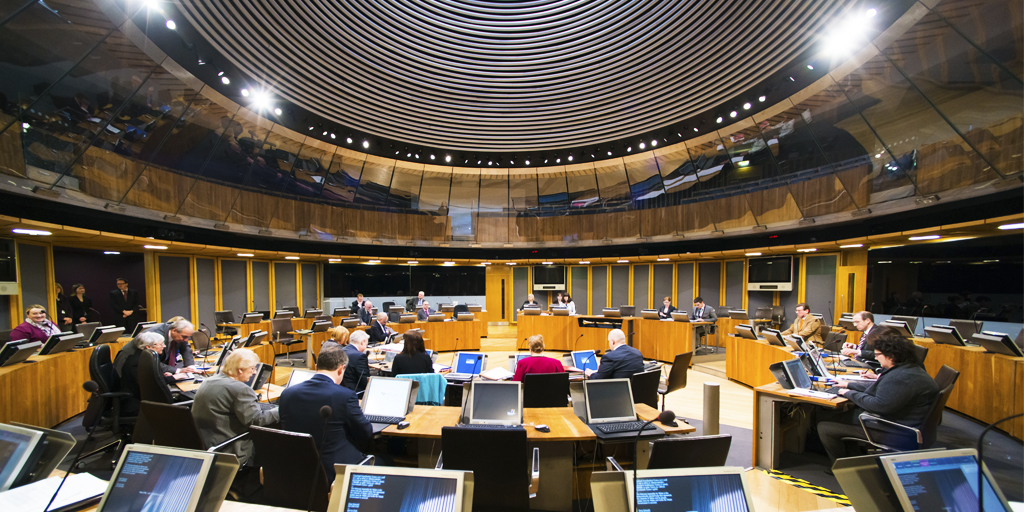Article by Alys Thomas, National Assembly for Wales Research Service
The 2015 Queen’s Speech was delivered to Parliament on 27 May 2015, in the wake of the General Election held on 7 May. It included details of the UK Government’s intention to bring forward a range of Bills during the 2015-16 Parliamentary Session.
The National Assembly for Wales’s annual Plenary debate on the Queen’s Speech will take place on 24 June 2015.
The Government of Wales Act 2006 retains a section entitling the Secretary of State for Wales to participate, but not to vote, in proceedings of the Assembly, and to have access to documents relevant to those proceedings
The Act also retains the requirement for the Secretary of State for Wales to consult the Assembly about the UK Government's legislative programme and to participate in a plenary session of the Assembly at least once in a session of Parliament.
The motion for Debate is laid by the Presiding Officer and states:
NDM5792 Rosemary Butler (Newport West)
The National Assembly for Wales:
Notes the content of the UK Government's legislative programme 2015/2016
AMs may lay amendments to the motion.
The Secretary of State opens the debate, speaking for up to 20 minutes, The Welsh Government then has up to 20 minutes to respond then the debate is opened up to the Chamber.
The Research Service has published a paper on the Queen’s Speech which details all Bills announced. There are some major constitutional Bills including:
- The Wales Bill which will enact the UK Government’s proposals which were set out in its policy paper Powers for a Purpose: Towards a lasting devolution settlement for Wales in February 2015. These include some of the recommendations of the second report of the Silk Commission on devolution in Wales on new powers for Wales and a move to a reserved powers model of devolution. The Bill will also implement some of the recommendations of the Smith Commission on powers for Scotland that the UK Government believes are appropriate for Wales. Draft legislation is expected in the autumn.
- The European Union Referendum Bill is to enable a referendum to allow the electorate to have an in-out vote on the UK’s membership of the European Union (EU) before the end of 2017. This has received First and Second Readings in the House of Commons and begun consideration by a Committee of the Whole House.
- The UK Government has introduced a Scotland Bill which is to reflect the commitment to further devolved powers for Scotland made prior to the independence referendum in September 2014, and the recommendations of the Smith Commission Agreement in November 2014. This has already received First and Second Readings in the House of Commons and begun consideration by a Committee of the Whole House.
Other key Bills include:
- The Energy Bill includes measures to increase energy security, including proposals relating to Onshore Wind. The UK Government is considering how this will apply to Wales in the context of the St David’s Day process. Changes proposed by the Silk Commission would mean that Wales will in future have the power to decide how they wish to manage planning applications for onshore wind up to 350MW.
- The Enterprise Bill is to encourage business by cutting red tape and making it easier for small businesses to resolve disputes quickly and easily.
- The National Insurance Contributions and Finance Bill is to ensure there are no rises in income tax rates, value-added tax or National Insurance for the next five years.
- The Immigration Bill where proposals include introducing an offence of illegal working. It will allow the wages paid to illegal migrants to be seized as proceeds of crime.
- The Extremism Bill which is intended to strengthen government and law enforcement powers to combat extremism.
- The Policing and Criminal Justice Bill which will introduce a number of reforms to the criminal justice system. The Bill will cover both devolved and reserved matters.
- The Full Employment and Welfare Benefits Bill aims to deliver the UK Government’s commitment to freeze the main rates of a number of working-age benefits, tax credits and Child Benefit, and to reduce the level of the benefit cap.
- The Trade Unions Bill includes proposals to introduce a 50 per cent voting threshold for union ballots turnouts (and retain the requirement for there to be a simple majority of votes in favour).







